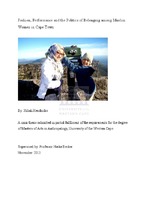| dc.contributor.advisor | Becker, Heike | |
| dc.contributor.author | Hendricks, Hibah | |
| dc.date.accessioned | 2015-02-12T09:27:27Z | |
| dc.date.available | 2015-02-12T09:27:27Z | |
| dc.date.issued | 2013 | |
| dc.identifier.uri | http://hdl.handle.net/11394/3968 | |
| dc.description | Magister Artium - MA | en_US |
| dc.description.abstract | This thesis explores how the hijab fashion market has emerged in Cape Town and
how Capetonian Muslim women are appropriating hijab fashion as a means of
redefining themselves as Muslim South Africans instead of ‘Cape Malays’, the ethnic
label given to Muslims in the Western Cape during the apartheid era. I argue that
through self stylisation Cape Malay women are performatively rejecting the
ethnicisation of Islam during apartheid. I show that ‘Cape Malay’ women are using
hijab fashion to perform their ‘Muslimness’ in order to claim a positive and legitimate spot in the ‘rainbow nation’ as Muslims as a religious-cultural category, and not as ‘Malays’, an ethnic category, while simultaneously claiming their belonging to the global umma (Muslim community) | en_US |
| dc.language.iso | en | en_US |
| dc.publisher | University of the Western Cape | en_US |
| dc.subject | Muslim women | en_US |
| dc.subject | Cape Malay | en_US |
| dc.subject | Islamic wear | en_US |
| dc.subject | Hijab fashion | en_US |
| dc.subject | Self stylisation | en_US |
| dc.subject | Performance | en_US |
| dc.subject | Belonging | en_US |
| dc.subject | International Umma | en_US |
| dc.subject | Cape Town | en_US |
| dc.subject | South Africa | en_US |
| dc.title | Fashion, performance and the politics of belonging among Muslim women in Cape Town | en_US |
| dc.type | Thesis | en_US |
| dc.rights.holder | University of the Western Cape | en_US |

